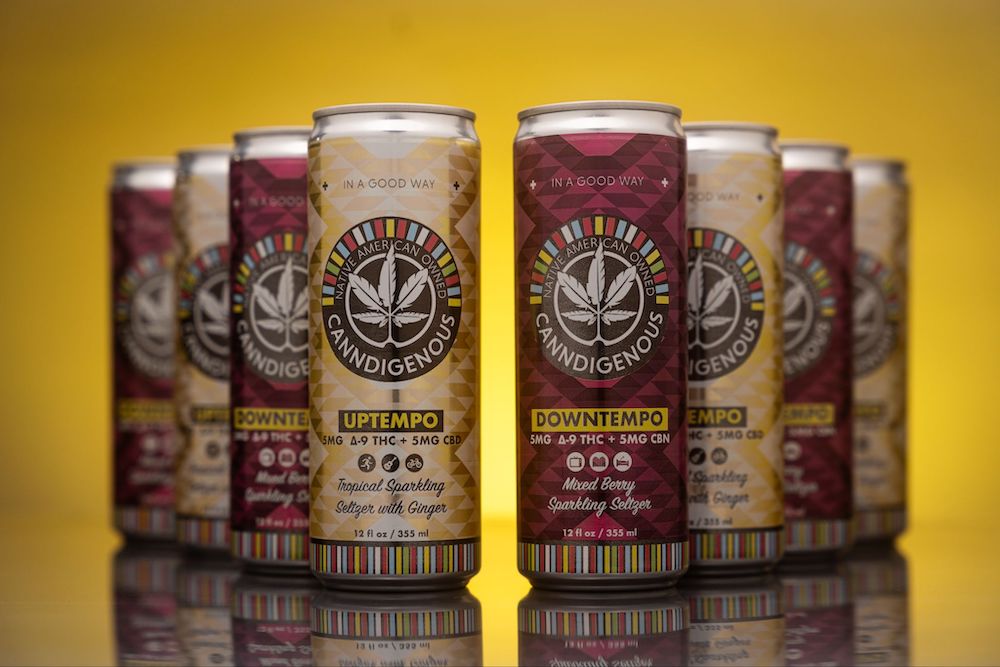
- Details
- By Chez Oxendine
- Indigenous Entrepreneurs
Canndigenous, a Wisconsin cannabis company founded by a member of the Bad River Band of Lake Superior Chippewa, is launching the first low-dose THC seltzers from an Indigenous-owned brand.
The seltzers — named Uptempo and Downtempo — are made with a blend of tetrahydrocannabinol (THC) and either cannabidiol (CBD) for an energy boost, or cannabinol (CBN) for a calming effect, according to Canndigenous founder and co-owner Rob Pero, a member of the Bad River Band.
As legalization of hemp-based products for both medical and recreational use spreads across the U.S., so too does Pero’s potential customer base. The global demand for cannabis-infused drinks stood at $1.2 billion in 2023 and is expected to grow to $5.8 billion by 2033, per a report by analyst firm Future Market Insights.
Together, Uptempo and Downtempo mark the next step for his business’ expansion into growing national and international markets, Pero said.
“We've done a good job of moderating the pace at which we've grown,” Pero said. “Though we have not been crazy profitable, we've hung around and kept producing. We've been waiting for the right time … to step up our game on an international scale.”
The drinks will be introduced the week of March 11 at the National Center for American Indian Enterprise Development’s 2024 Reservation Economic Summit, or RES. The launch comes at a flashpoint for Native hemp producers and the wider industry, Pero said. Hemp and cannabis industry leaders look to include Native and tribal operations in their supply chain, while elsewhere, nanotechnology companies look to Native providers as a potential source for hemp biomass.
That makes RES, where many of those leaders are prepared to meet with Indigenous operators and business owners, the perfect place to launch the drinks and discuss the Native role in a rapidly growing market, Pero said.
“RES is a nationwide platform promoting Indigenous economic development and industry innovation,” Pero said. “It is the perfect time to celebrate the release of our first seltzers and continue our mission to build sustainable economic opportunity for the Indigenous-led hemp and cannabis industry.”
Low-dose, high-impact
A can of Uptempo or Downtempo contains a very small amount of THC — the psychoactive agent in cannabis plants — compared to what you’d find in a standard edible, Pero said. The produced effect should be light compared to both smoked and edible hemp products as well as alcoholic beverages, which Pero sees as the chief competition.
Uptempo/Downtempo’s target audience are people who want a “lifestyle beverage” as a delivery method for cannabis, whether that’s the psychoactive element of THC or the calming or boosting effects of CBN/CBD, Pero said. The drinks can serve as either a light application, or a way for people intimidated by traditional ingestion methods to try something new.
“It's also for people that are new to the industry and people that are looking for a less threatening way to understand it. It's very intimidating to say ‘I'm going to go smoke a joint or eat a gummy,’” Pero said. “Everyone has a horror story about their friend that might have tried that, so our goal with Canndigenous is to be inclusive and to make that more palatable.”
Pero also pointed to a COVID-era trend of people trying to “find relief” through means other than alcohol as an opportunity for cannabis-derived products. During the first six months of 2023, for example, spirits sales dropped in the U.S. by 4.2 percent, according to data reported by trade publication The Spirits Business. That’s especially true for Native American communities, a demographic hit harder than most by alcoholism, Pero said.
“It’s about application, right? How can I get my medicine in a way that feels comfortable to me, tastes good, and that I know I can control in some way?” Pero said. “The trend is moving away from alcohol, and I think we’re up against a brick wall to say alcohol is bad. We know it’s bad. We have this belief that cannabis is a more homeopathic medicine that can provide relief without the ill effects, the hangovers, and the excess that comes with alcohol.”
Canndigenous, which Pero founded alongside business partners in 2019, operates primarily as a cultivator, growing hemp on a 10-acre farm and selling from a store in Cambridge, Wisconsin.
The company currently consists of Pero, an equity partner, and a range of subcontractors. To pull Uptempo/Downtempo together, Canndigenous worked with partners through the Indigenous Cannabis Industry Association (ICIA), a non-profit collective of Native tribes, attorneys, accountants, and cannabis operators and businesses that Pero also founded.
The drinks are created via a proprietary process involving nanotechnology and hemp biomass. Through ICIA, Canndigenous is working to source more hemp and other supplies from Indigenous businesses wherever possible, Pero said.
“We want people to know there's some aspects of that that we think are really important - not to just bring in biomass from all over the world, but to know what the supply chain is, to know that there are Indigenous communities that are growing that product for us,” Pero said. “ICIA develops more farmers to enhance that supply chain - these things create real jobs. There's a trickle down effect that's the method behind our madness.”
